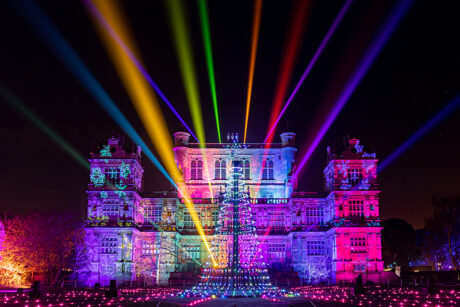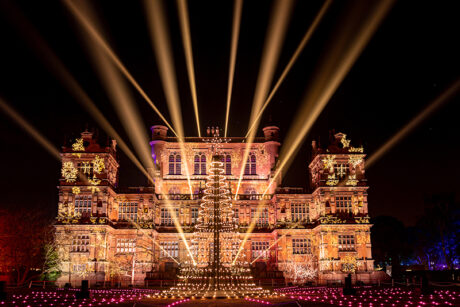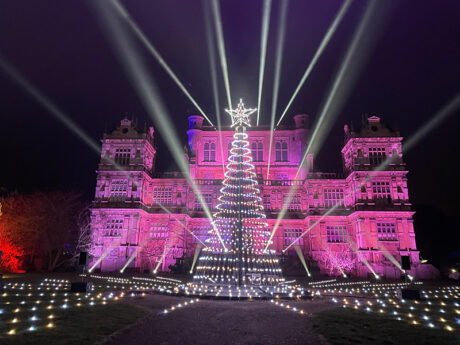
The 16th century stately home of Wollaton Hall was given a spectacular lighting treatment for Christmas, when production company dbnAudile provided visitors with a beautiful light trail through the grounds, completed by a stunning finale against the backdrop of the house itself. For all of this, dbnAudile used a Vista by Chroma-Q control system, sourced from A.C. Entertainment Technologies (AC-ET), to provide stability behind the scenes.
Manchester-based rental and production house dbnAudile, a long-standing user of Vista by Chroma-Q, was contracted by Kilimanjaro Live for the Christmas at Wollaton project, which ran from December into January. Their team delivered the 1.2km light trail made up of 12 individual lighting installations, plus the grand finale at the house, which featured a lighting rig including IP65-rated Panorama IP Airbeams from PROLIGHTS, also supplied via AC-ET.

Although Vista is capable of site-wide control, the dbnAudile team saved time by dividing the site into separate control zones which could then be programmed simultaneously. As dbnAudile’s Andy Kennet says, “There is a two-week build, with a week for programming and final checks, so the programming time is tight. Having separate consoles speeds up this process.” They used four individual systems across the site, choosing Vista S1 and EX control surfaces for their compact frames, which fit neatly into the individual control ‘sheds’.
dbnAudile has long been a fan of Vista control. “The software is very intuitive, allowing users with varying levels of knowledge to jump on and get the lights working,” Kennet explains. “The graphical layout enables us to separate the installations, with a clean and clear understanding of the fixtures and their locations. The timeline control gives a precise overview of the fixture attributes, enabling detailed editing to achieve complex effects. The insertion of commands is another great tool: with a master show cuelist triggering other cues, you can create a highly detailed show.”
The three-and-a-half-minute finale, which took two nights to program, repeated for six hours on each of 30 nights. It consisted of over 700 cues, split over numerous cuelists. It was triggered by timecode, via a QLab source (which handled the master clock and audio playback), and was controlled from a Vista EX console. Lighting designer and programmer was AC-ET’s Jack Moorhouse, called in to assist the production team during this busy period. Working with a plot created and installed by dbnAudile, Moorhouse was tasked with creating a lightshow that would complement the bespoke audio track and capture the interest of the watching guests.

Kennet says, “It was great to have Jack on site, giving tips and tricks to our other programmers. His knowledge of the console is second to none, and access to the latest software enabled us to create a dynamic finale, using the full capability of the Vista.”
The centrepiece of the finale was an “explosion” of light across the garden, culminating in a bespoke Christmas Tree and star, produced through thousands of individual LED pixels, controlled directly from Vista’s in-built pixel-mapper. “Vista’s latest GUI and the improvements to timecode ‘learn-timing’ really streamlined the timecode programming process,” says Moorhouse.
He concludes, “The audio track had lots of ‘twinkly’ accents, of ever-changing tempo and length. With Vista’s BPM-based effects engine and ‘one shot’ effects, I was able to accurately program matching visuals and have these play back hundreds of times, perfectly in sync with the audio. What’s more, Vista’s generic fixture model meant I could program these elements once on the Christmas Tree and then immediately apply the same effect to the supporting floods, profiles and beams.”
For more information, visit www.chroma-q.com


